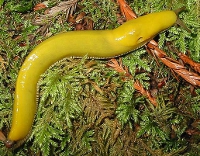Слизняк
Okay, I lied on Friday. My favorite word in Russian is not слизь. It's слизняк. Слизь of course means mucous, and -няк is a suffix that forms a new noun, so слизняк is a ‘mucousling,’ in other words... a slug! Isn't that an awesome word?
Growing up in Tucson, Arizona, I never saw a live slug, so imagine my surprise when I moved to Seattle where they have banana slugs, which are bright yellow critters as long as a human arm!¹ Here's a picture:

Those -няк suffixes usually produce an end-stressed noun:
| Sg | Pl | |
| Nom | слизняк | слизняки |
| Acc | слизняка | слизняков |
| Gen | ||
| Pre | слизняке | слизняках |
| Dat | слизняку | слизнякам |
| Ins | слизняком | слизняками |
There is a more scientific version of this word as well, which is слизень. It is a soft masculine noun with a fleeting vowel:
| Sg | Pl | |
| Nom | слизень | слизни |
| Acc | слизня | слизней |
| Gen | ||
| Pre | слизне | слизнях |
| Dat | слизню | слизням |
| Ins | слизнем | слизнями |
Slugs are harmless unless you have a garden, in which case those slimy bastards will really piss you off:
| Уже третий год ведём борьбу с противными слизняками, которые портят и уничтожают капусту. (source) | For three years now we've been warring with revolting slugs that are spoiling and destroying our cabbage. |
| Как избавиться от слизняков? | How can you get rid of slugs? |
| Если на участке живут жабы, лягушки и ежи, то слизни не представляют серьезной опасности для огорода. (adapted from this source) | If there are toads, frogs and hedgehogs living on your plot, then slugs are not a serious threat to the garden. |
| Сок из слизняков и десерт из опарышей (source) | Slug juice and maggots for desert |
You really should follow the link to that last one. The site has beautiful photographs...
¹ Well, as long as newborn's forearm... not an adult's arm.
1 comment
It seems to me that the word “слизняк” is much more often used when it is addressed to a person. The meaning is somewhat close to the statement: “he does not have any balls” in english.
Form is loading...